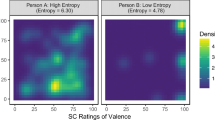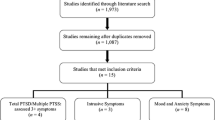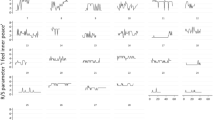Abstract
Experience sampling methodology (ESM) was used in a randomized controlled trial of short-term therapy to examine changes in daily affect and reactivity to daily event appraisals among depressed patients. Fifty-five depressed adults (mean age 37 years, 80 % female) were randomly assigned to one of two therapy conditions. Using an interactive voice response system, participants rated activities and emotional functioning eight times per day for 7 days. Twenty-nine participants completed treatment and repeated ESM at post-treatment. Broad improvements in mood, cognition, and physical functioning were similar across treatment conditions, with the largest improvements for markers of positive affect. Participants demonstrated increased resilience, i.e., diminished reactivity to stressors, at post-treatment. Changes in reactivity to positive daily situations were minimal. Findings underscore the utility of ESM in psychotherapy research and the importance of including measures of both positive and negative affect and experiences.




Similar content being viewed by others
Notes
Of the 44 exclusions, 38 % had an exclusionary diagnosis (e.g., bipolar); 35 % had subclinical depressive symptoms; 27 % had other exclusionary concerns (e.g., taking antidepressants, unable to follow through with study procedures).
Specifically, at baseline, people who were assigned to CBT had lower values (M = 4.34) than people assigned to SST (M = 4.84), but the means were similar post-treatment (CBT M = 4.78, SST M = 4.60).
References
American Psychiatric Association. (2000). Diagnostic and statistical manual of mental disorders (4th ed.—text revision). Washington, DC: American Psychiatric Publishing, Inc. Retrieved from http://search.ebscohost.com/login.aspx?direct=true&db=psyh&AN=1994-97698-000&site=ehost-live
Barge-Schaapveld, D. Q. C. M., & Nicolson, N. A. (2002). Effects of antidepressant treatment on the quality of daily life: An experience sampling study. Journal of Clinical Psychiatry, 63(6), 477–485.
Barge-Schaapveld, D. Q. C. M., Nicolson, N. A., van der Hoop, R. G., & DeVries, M. W. (1995). Changes in daily life experience associated with clinical improvement in depression. Journal of Affective Disorders, 34(2), 139–154. doi:10.1016/0165-0327(95)00012-C.
Barrantes-Vidal, N., Chun, C. A., Myin-Germeys, I., & Kwapil, T. R. (2013). Psychometric schizotypy predicts psychotic-like, paranoid, and negative symptoms in daily life. Journal of Abnormal Psychology, 122(4), 1077–1087. doi:10.1037/a0034793.
Beck, A. T., Epstein, N., Brown, G., & Steer, R. A. (1988). An inventory for measuring clinical anxiety: Psychometric properties. Journal of Consulting and Clinical Psychology, 56(6), 893–897.
Beck, A. T., Steer, R. A., & Brown, G. K. (1996). Manual for the Beck Depression Inventory-II. San Antonio, TX: Psychological Corporation.
Ben-Zeev, D., & Young, M. A. (2010). Accuracy of hospitalized depressed patients’ and healthy controls’ retrospective symptom reports: An experience sampling study. Journal of Nervous and Mental Disease, 198(4), 280–285.
Ben-Zeev, D., Young, M. A., & Madsen, J. W. (2009). Retrospective recall of affect in clinically depressed individuals and controls. Cognition and Emotion, 23(5), 1021–1040.
Burgin, C. J., Silvia, P. J., Eddington, K. M., & Kwapil, T. R. (2012). Palm or cell? Comparing personal digital assistants and cell phones for experience sampling research. Social Science Computer Review, 31(2), 244–251. doi:10.1177/0894439312441577.
Bylsma, L. M., Taylor-Clift, A., & Rottenberg, J. (2011). Emotional reactivity to daily events in major and minor depression. Journal of Abnormal Psychology, 120(1), 155–167. doi:10.1037/a0021662.
Conner, T. S., Tennen, H., Fleeson, W., & Barrett, L. F. (2009). Experience sampling methods: A modern idiographic approach to personality research. Social and Personality Psychology Compass, 3(3), 292–313. doi:10.1111/j.1751-9004.2009.00170.x.
Depp, C. A., Kim, D. H., de Dios, L. V., Wang, V., & Ceglowski, J. (2012). A pilot study of mood ratings captured by mobile phone versus paper-and-pencil mood charts in bipolar disorder. Journal of Dual Diagnosis, 8(4), 326–332. doi:10.1080/15504263.2012.723318.
Dozois, D. J. A., Dobson, K. S., & Ahnberg, J. L. (1998). A psychometric evaluation of the Beck Depression Inventory-II. Psychological Assessment, 10(2), 83–89.
Ebner-Priemer, U. W., & Trull, T. J. (2009). Ambulatory assessment: An innovative and promising approach for clinical psychology. European Psychologist, 14(2), 109–119. doi:10.1027/1016-9040.14.2.109.
Eddington, K. M., Silvia, P. J., Foxworth, T. E., Hoet, A., & Kwapil, T. R. (2015). Motivational deficits differentially predict improvement in a randomized trial of self-system therapy for depression. Journal of Consulting and Clinical Psychology, 83(3), 602–616. doi:10.1037/a0039058.
Fisher, C. D., & To, M. L. (2012). Using experience sampling methodology in organizational behavior. Journal of Organizational Behavior, 33(7), 865–877. doi:10.1002/job.1803.
Forbes, E. E., Stepp, S. D., Dahl, R. E., Ryan, N. D., Whalen, D., Axelson, D. A., et al. (2012). Real-world affect and social context as predictors of treatment response in child and adolescent depression and anxiety: An ecological momentary assessment study. Journal of Child and Adolescent Psychopharmacology, 22(1), 37–47. doi:10.1089/cap.2011.0085.
Fydrich, T., Dowdall, D., & Chambless, D. L. (1992). Reliability and validity of the Beck Anxiety Inventory. Journal of Anxiety Disorders, 6(1), 55–61. doi:10.1016/0887-6185(92)90026-4.
Geschwind, N., Peeters, F., Drukker, M., van Os, J., & Wichers, M. (2011). Mindfulness training increases momentary positive emotions and reward experience in adults vulnerable to depression: A randomized controlled trial. Journal of Consulting and Clinical Psychology, 79(5), 618–628. doi:10.1037/a0024595.
Hans, E., & Hiller, W. (2013). Effectiveness of and dropout from outpatient cognitive behavioral therapy for adult unipolar depression: A meta-analysis of nonrandomized effectiveness studies. Journal of Consulting and Clinical Psychology, 81(1), 75–88. doi:10.1037/a0031080.
Hartmann, J. A., Wichers, M., Menne-Lothmann, C., Kramer, I., Viechtbauer, W., Peeters, F., et al. (2015). Experience sampling-based personalized feedback and positive affect: A randomized controlled trial in depressed patients. PLoS ONE, 10(6), e0128095. doi:10.1371/journal.pone.0128095.
Hofmann, S. G., Sawyer, A. T., Fang, A., & Asnaani, A. (2012). Emotion dysregulation model of mood and anxiety disorders. Depression and Anxiety, 29(5), 409–416. doi:10.1002/da.21888.
Johnson, E. I., Grondin, O., Barrault, M., Faytout, M., Helbig, S., Husky, M., et al. (2009). Computerized ambulatory monitoring in psychiatry: A multi-site collaborative study of acceptability, compliance, and reactivity. International Journal of Methods in Psychiatric Research, 18(1), 48–57. doi:10.1002/mpr.276.
Kroenke, K., Spitzer, R. L., & Williams, J. B. W. (2001). The PHQ-9: Validity of a brief depression severity measure. Journal of General Internal Medicine, 16(9), 606–613. doi:10.1046/j.1525-1497.2001.016009606.x.
Moore, T. M., Seavey, A., Ritter, K., McNulty, J. K., Gordon, K. C., & Stuart, G. L. (2014). Ecological momentary assessment of the effects of craving and affect on risk for relapse during substance abuse treatment. Psychology of Addictive Behaviors, 28(2), 619–624. doi:10.1037/a0034127.
Myin-Germeys, I., Peeters, F., Havermans, R., Nicolson, N. A., deVries, M. W., Delespaul, P., et al. (2003). Emotional reactivity to daily life stress in psychosis and affective disorder: An experience sampling study. Acta Psychiatrica Scandinavica, 107(2), 124–131. doi:10.1034/j.1600-0447.2003.02025.x.
Naylor, M. R., Keefe, F. J., Brigidi, B., Naud, S., & Helzer, J. E. (2008). Therapeutic interactive voice response for chronic pain reduction and relapse prevention. Pain, 134(3), 335–345. doi:10.1016/j.pain.2007.11.001.
Nezlek, J. B., & Gable, S. L. (2001). Depression as a moderator of relationships between positive daily events and day-to-day psychological adjustment. Personality and Social Psychology Bulletin, 27(12), 1692–1704. doi:10.1177/01461672012712012.
Palmier-Claus, J. E., Myin-Germeys, I., Barkus, E., Bentley, L., Udachina, A., Delespaul, P. A. E. G., et al. (2011). Experience sampling research in individuals with mental illness: Reflections and guidance. Acta Psychiatrica Scandinavica, 123(1), 12–20.
Parkinson, B., Briner, R. B., Reynolds, S., & Totterdell, P. (1995). Time frames for mood: Relations between momentary and generalized ratings of affect. Personality and Social Psychology Bulletin, 21, 331–339.
Peeters, F., Berkhof, J., Rottenberg, J., & Nicolson, N. A. (2010). Ambulatory emotional reactivity to negative daily life events predicts remission from major depressive disorder. Behaviour Research and Therapy, 48(8), 754–760. doi:10.1016/j.brat.2010.04.008.
Peeters, F., Nicolson, N. A., Berkhof, J., Delespaul, P., & deVries, M. (2003). Effects of daily events on mood states in major depressive disorder. Journal of Abnormal Psychology, 112(2), 203–211.
Radloff, L. S. (1977). The CES-D Scale: A self-report depression scale for research in the general population. Applied Psychological Measurement, 1(3), 385–401.
Raudenbush, S. W., & Bryk, A. S. (2002). Hierarchical linear models: Applications and data analysis methods (Vol. 1). Sage. Retrieved from https://books.google.com/books?hl=en&lr=&id=uyCV0CNGDLQC&oi=fnd&pg=PR17&dq=raudenbush+hierarchical+linear+models+2002&ots=qA4NTo04QH&sig=cRKsXiQfDOVHKnLr3MlR66Uf1a4
Reppermund, S., Ising, M., Lucae, S., & Zihl, J. (2009). Cognitive impairment in unipolar depression is persistent and non-specific: Further evidence for the final common pathway disorder hypothesis. Psychological Medicine, 39(4), 603–614. doi:10.1017/S003329170800411X.
Roca, M., Monzón, S., Vives, M., López-Navarro, E., Garcia-Toro, M., Vicens, C., et al. (2015). Cognitive function after clinical remission in patients with melancholic and non-melancholic depression: A 6 month follow-up study. Journal of Affective Disorders, 171, 85–92. doi:10.1016/j.jad.2014.09.018.
Rose, G. L., Skelly, J. M., Badger, G. J., Naylor, M. R., & Helzer, J. E. (2012). Interactive voice response for relapse prevention following cognitive–behavioral therapy for alcohol use disorders: A pilot study. Psychological Services, 9(2), 174–184. doi:10.1037/a0027606.
Schrader, G., Davis, A., Stefanovic, S., & Christie, P. (1990). The recollection of affect. Psychological Medicine, 20(1), 105–109. doi:10.1017/S0033291700013271.
Shacham, S. (1983). A shortened version of the Profile of Mood States. Journal of Personality Assessment, 47(3), 305–306.
Silvia, P. J., Kwapil, T. R., Eddington, K. M., & Brown, L. H. (2013). Missed beeps and missing data: Dispositional and situational predictors of nonresponse in experience sampling research. Social Science Computer Review, 31(4), 471–481.
South, S. C., & Miller, M. L. (2014). Measuring momentary stress, affect, and cognition: Relationships with the internalizing and externalizing spectra. Journal of Psychopathology and Behavioral Assessment, 36(1), 93–104. doi:10.1007/s10862-013-9365-2.
Strauman, T. J., Vieth, A. Z., Merrill, K. A., Kolden, G. G., Woods, T. E., Klein, M. H., et al. (2006). Self-system therapy as an intervention for self-regulatory dysfunction in depression: A randomized comparison with cognitive therapy. Journal of Consulting and Clinical Psychology, 74(2), 367–376.
Tidey, J. W., Monti, P. M., Rohsenow, D. J., Gwaltney, C. J., Miranda, R. J., McGeary, J. E., et al. (2008). Moderators of naltrexone’s effects on drinking, urge, and alcohol effects in non-treatment-seeking heavy drinkers in the natural environment. Alcoholism, Clinical and Experimental Research, 32(1), 58–66. doi:10.1111/j.1530-0277.2007.00545.x.
van Hooff, M. L. M., Geurts, S. A. E., Kompier, M. A. J., & Taris, T. W. (2007). “How fatigued do you currently feel?” Convergent and discriminant validity of a single-item fatigue measure. Journal of Occupational Health, 49(3), 224–234.
Vieth, A. Z., Strauman, T. J., Kolden, G. G., Woods, T. E., Michels, J. L., & Klein, M. H. (2003). Self-system therapy (SST): A theory-based psychotherapy for depression. Clinical Psychology: Science and Practice, 10(3), 245–268.
Watkins, E. R., Mullan, E., Wingrove, J., Rimes, K., Steiner, H., Bathurst, N., et al. (2011). Rumination-focused cognitive-behavioural therapy for residual depression: Phase II randomised controlled trial. The British Journal of Psychiatry, 199(4), 317–322. doi:10.1192/bjp.bp.110.090282.
Watson, D., Clark, L. A., & Tellegen, A. (1988). Development and validation of brief measures of positive and negative affect: The PANAS scales. Journal of Personality and Social Psychology, 54(6), 1063–1070. doi:10.1037/0022-3514.54.6.1063.
Wichers, M. C., Barge-Schaapveld, D. Q. C. M., Nicolson, N. A., Peeters, F., de Vries, M., Mengelers, R., et al. (2009). Reduced stress-sensitivity or increased reward experience: The psychological mechanism of response to antidepressant medication. Neuropsychopharmacology, 34(4), 923–931. doi:10.1038/npp.2008.66.
Acknowledgments
This research was supported by Award Number R21MH090414 from the National Institute of Mental Health (Trial Registration Number NCT02134678). The content is solely the responsibility of the authors and does not necessarily represent the official views of the National Institute of Mental Health or the National Institutes of Health. We thank Tamara E. Foxworth and Ariana Hoet for their assistance with data collection.
Author information
Authors and Affiliations
Corresponding author
Ethics declarations
Conflict of Interest
Kari M. Eddington, Chris J. Burgin, Paul J. Silvia, Niloofar Fallah, Catherine Majestic and Thomas R. Kwapil declare that they have no conflict of interest.
Ethical Approval
All procedures performed in studies involving human participants were in accordance with the ethical standards of the institutional and/or national research committee and with the 1964 Helsinki declaration and its later amendments or comparable ethical standards.
Informed Consent
All procedures followed were in accordance with the ethical standards of the responsible committee on human experimentation (national and institutional). Informed consent was obtained from all individual subjects participating in the study.
Animal Rights
No animal studies were carried out by the authors for this article.
Rights and permissions
About this article
Cite this article
Eddington, K.M., Burgin, C.J., Silvia, P.J. et al. The Effects of Psychotherapy for Major Depressive Disorder on Daily Mood and Functioning: A Longitudinal Experience Sampling Study. Cogn Ther Res 41, 266–277 (2017). https://doi.org/10.1007/s10608-016-9816-7
Published:
Issue Date:
DOI: https://doi.org/10.1007/s10608-016-9816-7




